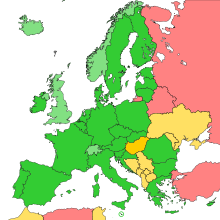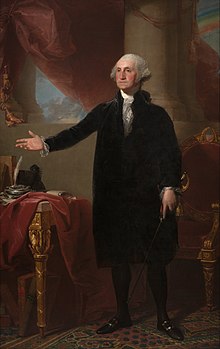| Main | Topics and categories | Tasks and projects |
The Politics portal
Politics (from Ancient Greek πολιτικά (politiká) 'affairs of the cities') is the set of activities that are associated with making decisions in groups, or other forms of power relations among individuals, such as the distribution of resources or status. The branch of social science that studies politics and government is referred to as political science.
They may be used positively in the context of a "political solution" which is compromising and non-violent, or descriptively as "the art or science of government", but also often carries a negative connotation. The concept has been defined in various ways, and different approaches have fundamentally differing views on whether it should be used extensively or in a limited way, empirically or normatively, and on whether conflict or co-operation is more essential to it.
A variety of methods are deployed in politics, which include promoting one's own political views among people, negotiation with other political subjects, making laws, and exercising internal and external force, including warfare against adversaries. Politics is exercised on a wide range of social levels, from clans and tribes of traditional societies, through modern local governments, companies and institutions up to sovereign states, to the international level.
In modern nation states, people often form political parties to represent their ideas. Members of a party often agree to take the same position on many issues and agree to support the same changes to law and the same leaders. An election is usually a competition between different parties.
A political system is a framework which defines acceptable political methods within a society. The history of political thought can be traced back to early antiquity, with seminal works such as Plato's Republic, Aristotle's Politics, Confucius's political manuscripts and Chanakya's Arthashastra. (Full article...)
Selected article

Regulamentul Organic (Romanian: [reɡulaˈmentul orˈɡanik], English: Organic Regulation; French: Règlement Organique; Russian: Органический регламент, romanized: Organichesky reglament) was a quasi-constitutional organic law enforced in 1831–1832 by the Imperial Russian authorities in Moldavia and Wallachia (the two Danubian Principalities that were to become the basis of the modern Romanian state). The document partially confirmed the traditional government, including rule by the hospodars, and set up a common Russian protectorate which lasted until 1854. The Regulamentul itself remained in force until 1858. Conservative in its scope, it also engendered a period of unprecedented reforms which provided a setting for the Westernization of the local society. The Regulamentul offered the two Principalities their first common system of government.
Featured picture

Parliament House is the meeting facility of the Parliament of Australia located in Canberra, the capital of Australia. The building was designed by Mitchell/Giurgola Architects and opened on 9 May 1988 by Elizabeth II, Queen of Australia. At the time of the construction, it was the most expensive building in the world at more than A$1.1 billion.
Members are first elected to the legislature during general elections. General elections must be conducted every four years from the date of the last election, but the premier may ask for early dissolution of the Legislative Assembly. An election may also happen if the governing party loses the confidence of the legislature by the defeat of a supply bill or tabling of a confidence motion. (Full article...)
Eight of Arizona's fifteen counties are named after various Native American groups that are resident in parts of what is now Arizona, with another (Cochise County) being named after a native leader. Four other counties, Gila County, Santa Cruz County, Pinal County, and Graham County, are named for physical features of Arizona's landscape: the Gila River, the Santa Cruz River, Pinal Peak, and Mount Graham, respectively. Another county, La Paz County, is named after a former settlement, while the final county, Greenlee County, is named after one of the state's early pioneers. (Full article...)

Over 20 graduates of the United States Naval Academy (USNA) have served as members of the United States Congress as legislators in the United States Senate or United States House of Representatives or in their home nation. The Naval Academy is an undergraduate college in Annapolis, Maryland, with the mission of educating and commissioning officers for the Navy and Marine Corps. The Academy is often referred to as Annapolis, while sports media refer to the Academy as "Navy" and the students as "Midshipmen"; this usage is officially endorsed. During the latter half of the 19th century and the first decades of the 20th, the United States Naval Academy was the primary source of U.S. Navy and Marine Corps officers, with the Class of 1881 being the first to provide officers to the Marine Corps. Graduates of the Academy are also given the option of entering the United States Army or United States Air Force. Most Midshipmen are admitted through the congressional appointment system. The curriculum emphasizes various fields of engineering.
This list is drawn from graduates of the Naval Academy who became members of Congress or its equivalent in their native country. The Academy was founded in 1845 and graduated its first class in 1846. The first alumnus to graduate and go on to become a member of Congress was John Buchanan Robinson, who graduated from the Class of 1868. As of March 2009, three alumni are members of Congress: Senator John McCain (class of 1958), Senator James H. Webb, Jr. (class of 1968), and Representative Joe Sestak (class of 1974). Roilo Golez (class of 1970) served as a Congressman in his native country, the Philippines. (Full article...)

█ ASEAN full member states
█ ASEAN candidate member state
█ ASEAN observer state
██ ASEAN Plus Three
███ East Asia Summit
██████ ASEAN Regional Forum
, the Association of Southeast Asian Nations (ASEAN) has 10 member states, one candidate member state, and one observer state.
ASEAN was founded on 8 August 1967 with five member states: Indonesia, Malaysia, the Philippines, Singapore, and Thailand. It is headquartered in Jakarta. (Full article...)

Freedom House ratings for European Union and surrounding states, as of 2019.
Member states of the European Union use various forms of democracy. The European Union (EU) is a sui generis supranational union of states. At a European Council Summit held in Copenhagen, Denmark, on 21 June and 22 June 1993, the European Union defined the Copenhagen criteria regarding the conditions a candidate country has to fulfill to be considered eligible for accession to the European Union:
Consequently, all member states have direct elections, nominally democratic states that are considered to be "free" or "partly free" according to the criteria of Freedom House. As of 2020, there is no expert consensus on how to classify Hungary's regime type; Freedom House considers it a hybrid regime. As of 2015, all European Union member states are representative democracies; however, they do not all have the same political system, with most of the differences arising from different historical backgrounds. (Full article...)
Selected quote
Selected biography
Ramón Emeterio Betances was a Puerto Rican nationalist. He was the primary instigator of the Grito de Lares revolution and, as such, is considered to be the father of the Puerto Rican independence movement. Betances was also the most renowned medical doctor and surgeon of his time in Puerto Rico, and one of its first social hygienists. He had established a successful surgery and ophthalmology practice. Betances was also a diplomat, public health administrator, poet and novelist. He served as representative and contact for Cuba and the Dominican Republic in Paris. A firm believer in Freemasonry, his political and social activism was deeply influenced by the group's philosophical beliefs. His personal and professional relationships (as well as the organizational structure behind the Grito de Lares, an event that, in theory, clashes with traditional Freemason beliefs) were based upon his relationships with Freemasons, their hierarchical structure, rites and signs.
Did you know (auto-generated) -

- ... that the London Forum, a British far-right organization, was described by an anti-fascist magazine as "[bridging] the fascist and Tory right"?
- ... that Disney once created a political advertisement for Dwight D. Eisenhower (featured)?
- ... that before becoming the mayor of Medan, Indonesia, Agus Salim Rangkuti acted in movies and oversaw a real-life political prison camp?
- ... that valence populism cannot be positioned on the left–right political spectrum?
- ... that Prawoto Mangkusasmito did not complete law school before the Japanese invaded because he was too busy with student and political organizations?
- ... that American journalist and activist Clara Leiser traveled to Nazi Germany frequently, and documented the plight of families of political prisoners?
More did you know...
- ...that Republican National Committee official Rob Bickhart wrote a PowerPoint presentation for a meeting of Republican fundraisers which depicted Nancy Pelosi as Cruella de Vil?
- ...that following its 1994 national convention, the Progress Party of Norway lost its deputy leader and the four MPs Christiansen, Hillgaar, Wetterstad and Bråthen?
- ...that Democrat Mayor Thomas G. Dunn, national co-chairman of Democrats for Nixon, was "read out of the party" for his support of Republican President Richard Nixon's 1972 re-election bid?
- ...that the 1968 pamphlet Is the School House the Proper Place to Teach Raw Sex? claimed that sex education was a Communist conspiracy?
- ...that the American Society of Magazine Editors book The Best American Magazine Writing 2007 features investigative journalism about the Beslan school hostage crisis and survivors of Agent Orange?
- ...that the Libyan opposition has embraced "Zenga Zenga", an Israeli-created auto-tuned song and viral YouTube video that parodies Libyan ruler Muammar Gaddafi (pictured)?
- ...that Nunez Community College in Chalmette, Louisiana, is named for the late wife of former Louisiana State Senate President Samuel B. Nunez, Jr.?
- ...that Roman embassies to China are reported in Chinese historical accounts from as early as 166?
In this month
- July 20, 1944 – an assassination attempt is made on Adolf Hitler with involvement by notable German conservatives.
- July 23, 1952 – The European Coal and Steel Community is established.
- July 27, 1830 – King Charles X of France is overthrown in the French Revolution of 1830, also known as the July Revolution.
- July 31, 1912 – American conservative economist, statistician, and Nobel Prize winner Milton Friedman is born.
News and Current events
- August 11: 4 local government areas in New South Wales, Australia locked down after COVID-19 case
- August 11: Australia: AstraZeneca vaccine access expanded by Victorian government
- August 1: Australia: Victorian lockdown lifted
- July 29: Tunisia's president dismisses prime minister, suspends parliament
- July 25: Australia: Wikinews interviews Reg Kidd, mayor of the City of Orange, about COVID-19 lockdown and local government
- July 23: South Australia enters week-long lockdown to contain COVID-19 Delta variant spread
- July 21: Technological University Dublin senior lecturer Dr Lorcan Sirr speaks to Wikinews on housing market in Ireland
- July 21: Three rural councils in New South Wales, Australia enter 7-day lockdown
- July 21: Australia: Victoria lockdown extended by a week with 85 active cases recorded
- July 15: California governor signs new state budget, eligible Californians to get stimulus payments
Topics and categories
General images
Related portals
Associated Wikimedia
The following Wikimedia Foundation sister projects provide more on this subject:
-
Commons
Free media repository -
Wikibooks
Free textbooks and manuals -
Wikidata
Free knowledge base -
Wikinews
Free-content news -
Wikiquote
Collection of quotations -
Wikisource
Free-content library -
Wikiversity
Free learning tools -
Wiktionary
Dictionary and thesaurus






















































